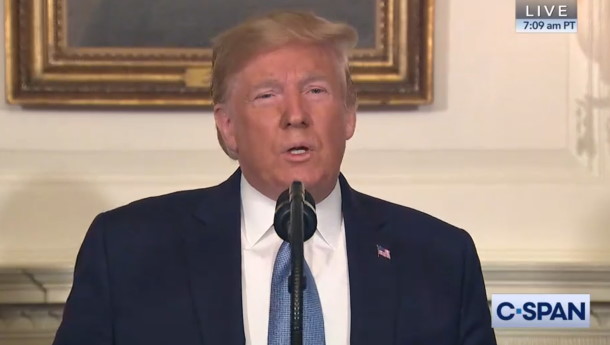US president Donald Trump blames videogames for fueling violent culture
Following the massacres in El Paso and Dayton, the president said that it's time to do something about videogames.

Speaking in the wake of mass murders in El Paso, Texas, and Dayton, Ohio, that left 30 people dead and more than 50 wounded, the president of the United States has called for a change in the nation's culture, specifically singling out the influence of violent videogames on youth.
"We must stop the glorification of violence in our society. This includes the gruesome and grisly videogames that are now commonplace," Trump said. "It is too easy today for troubled youth to surround themselves with a culture that celebrates violence. We must stop or substantially reduce this, and it has to begin immediately. Cultural change is hard, but each of us can choose to build a culture that celebrates the inherent worth and dignity of every human life. That's what we have to do."
He also pointed the finger of blame at the influence of the internet as a whole: "The perils of the internet and social media cannot be ignored, and they will not be ignored," he said. He added that he was directing federal agencies and social media companies to "develop tools that can detect mass shooters before they strike."
The statement read by the president acknowledged that the El Paso shooter had posted a manifesto "consumed by racist hate" online, and called on Americans to condemn racism, saying that "hate has no place" in the country. Unsurprisingly, however, the speech made no mention at all of Trump's own, ongoing contribution to the rise in virulent racism and related violence in the US. According to a BBC report, the El Paso shooter said his attack was a response to "the Hispanic invasion of Texas," a term Trump has used repeatedly in his racist incitement of anti-immigrant anger on social media.
"According to Facebook's ad archive, Trump has run around 2,200 FB ads since May 2018 mentioning the word 'invasion.' Scrolling through, all of them seem to be about immigration," Natalie Martinez, a researcher for Media Matters tweeted yesterday.
More troops being sent to the Southern Border to stop the attempted Invasion of Illegals, through large Caravans, into our Country. We have stopped the previous Caravans, and we will stop these also. With a Wall it would be soooo much easier and less expensive. Being Built!January 31, 2019
The El Paso shooter also expressed support for the Christchurch, New Zealand killer who murdered 51 people in March—and who, in his own screed (via Al Jazeera), also raged about "replacement" conspiracy theories and white supremacy, and praised Trump as "a symbol of renewed white identity and common purpose." Julia Ebner of the UK-based anti-extremist organization Institute for Strategic Studies told The Guardian that Trump's Twitter account is among the top-ten most influential Twitter sources propagating "great replacement" ideology online.
The president's remarks echo those of other Republican lawmakers who over the weekend sought to blame videogames as a causative factor in mass killings. Studies have repeatedly failed to find a causal link between videogames and real-world violence, however, and the anecdotal evidence speaks for itself: Videogames are ubiquitous throughout the developed world, but America's gun violence epidemic remains unique.
The biggest gaming news, reviews and hardware deals
Keep up to date with the most important stories and the best deals, as picked by the PC Gamer team.
Political leaders continue to invoke videogames in the event of mass shootings. Violent crime in the US has dramatically decreased since 1990, when moral panic over videogames spurred the creation of the ESRB, yet gun violence (of all types) has risen and remains wildly out of proportion to other Western nations, and the fear of videogames, largely stoked by politicians pandering to their bases, continues to flourish.
People have been saying for years that we should talk to Mexico. The problem is that Mexico is an “abuser” of the United States, taking but never giving. It has been this way for decades. Either they stop the invasion of our Country by Drug Dealers, Cartels, Human Traffickers....June 2, 2019
As well as driving anti-videogame hysteria amongst the nation's hand-wringing class, Trump's rhetoric had a material impact on major videogame publishers today: As reported by Bloomberg, Activision, Electronic Arts, and Take-Two shares all fell by at least five percent following the address.
Just prior to his speech, Trump called on Republican and Democrat legislators to "come together and get strong background checks," which he then, for no apparent reason, linked to the US immigration system.
....this legislation with desperately needed immigration reform. We must have something good, if not GREAT, come out of these two tragic events!August 5, 2019

Andy has been gaming on PCs from the very beginning, starting as a youngster with text adventures and primitive action games on a cassette-based TRS80. From there he graduated to the glory days of Sierra Online adventures and Microprose sims, ran a local BBS, learned how to build PCs, and developed a longstanding love of RPGs, immersive sims, and shooters. He began writing videogame news in 2007 for The Escapist and somehow managed to avoid getting fired until 2014, when he joined the storied ranks of PC Gamer. He covers all aspects of the industry, from new game announcements and patch notes to legal disputes, Twitch beefs, esports, and Henry Cavill. Lots of Henry Cavill.

